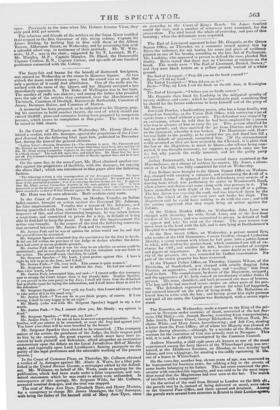In the Court of Exchequer, on Wednesday, Mr. Henry Hunt
ob- tained a verdict, with 40s. damages, against the proprietors of the Liver- pool Journal, for the following libel upon him, published in December last, during the time of the general election.
"Latest News I—Preston, December 14.—The election is over. Mr. Fleetwood and Mr. Stanley are returned; but we regret to state that there have been riots and loss of life. Mr. hunt seeinF Counsellor Segrave in the mob, pointed him out, saying, "there is a black sheep!' the mob fell upon him, and killed hint. Mr. Haut had his nose cut oft The Coroner's Inquest returned a verdict of Murder against him, and he is now in custody."
On the same day, in the same Court, Mr. Hunt obtained another ver- dict against the proprietors of the Globe, with 40s. damages, for copying the above libel; which was introduced in that paper after the following fashion.
"The following is from a city correspondent of the Liverpool Courant. We have never heard of the paper from which it proksses to be extracted. We doubt not it is a hoax of the provincial journals ; if so it is carrying election licence too far. It :weals that Mr. Hunt, seeing Counsellor Segrave in the mob, pointed hint out." It then proceeded as in the former case, and concluded with stating that " the Coroner's In- quest returned a verdict of Wilful Murder against Mr. Hunt, and he is now in custody."
Mr. Hunt was his own advocate. Both verdicts carry costs.
In the Court of Common Pleas, on Monday, Venafra, an Italian ballet-master, brought an action against the ReverendMr. Johnson, for false imprisonment. Venafra was a tenant of Mr. Johnson ; and baying quarrelled with him, said he " would have his blood." In con- sequence of this, and other threatening language, he was taken before a magistrate, and committed to prison for a day, in default of being able to find bail to keep the peace. It was for this imprisonment the action was brought. In the course of the trial the following conversa- tion occurred between Mr. Justice Park and the counsel.
Mr. Justice Park said he was of opinion the action would not lie, and that the piaintiff must be nonsuited.
Mr. Sergeant Spankie submitted that the question was for the Jury to decide. It did not fall within the province of the Judge to declare whether the defen- dant had acted or not on probable grounds. Mr. Justice Park said that it was his duty to see whether an action could be maintained ; and he was clearly of opinion that the defendant was not liable to the action. The plaintiff must, therefore, be called. Mr. Sergeant Spankie—" My Lord, I must protest against this. I have a right by law to go to the Jury, and I shall."
.Mr. Justice Park—" Oh, very well. This course is quite unusual." Mr. Sergeant Junes then rose to address the Jury. He had not said more than a few words, when
Mr. Justice Park interrupted him, and said—" I cannot suffer this trumpery case to occupy the Court longer than it has already done. Brother Spankie, if you persist in the case going to the Jury, I shall tell them that the defendant had probable cause for laying the information, and I shall desire them to find for the defendant."
Mr. Sergeant Spankie—" Very well, my Lord ; then I must advise my client to take notice of it in the usual way." Mr. Justice Park—" You can do as you think proper, of course. If I am wrong, I shall be very happy to be set right." Mr. Moody (who was with Mr. Sergeant Spankie) begged to say a few words.
Mr. Justice Park—" No, II cannot allow you, Mr. Moody : my opinion is Sxed."
Mr. Sergeant Spankie—" Will you, my Lord—"
Mr. Justice Park—" I do not sit here to answer categorical questions. Now, brother, will you submit to be nonsuited, or must the Jury find against you? You know your client will be more benefited by the former."
Mr. Sergeant Spankie then elected to be nonsuited. [The trumpery =tare of the action, the petulance of the Judge, the little respect paid to him by the counsel, the great expense which must have been in- curred by both plaintiff and defendant, afford altogether an instructive -commentary upon the debate on the Local Jurisdiction Bill of Monday night, and especially upon Lord Lyndhurst's flaming panegyric on the purity of the legal profession and the admirable working of the present system.] In the Court of Common Pleas, on Thursday, Mr. Colburn obtained a verdict of ls. damages against Mr. Alaric A. Watts, for a libel pub- lished in the United Service Gazette, a newspaper edited by the defend- ant. Mr. Williams, on behalf of Mr. Watts, made an apology for the publication; which had been made under a false impression, and con- tained statements which be was ready to admit were unfounded. In consequence of this apology, Mr. Sergeant Wilde, for Mr. Colburn, accepted nominal damages, and the trial was stopped.
The trial of Mary Ann Dyer, Elizabeth Dyer, and Henry Masters, for a conspiracy to charge Mr. James Montague, the City Surveyor, with being the father of the bastard child of Mary Ann 'Dyer, came
on yesterday in the Court of King's Bench. Sir James Scarlett stated the case, and a number of witnesses were examined, for the prosecution. The trial lasted the whole of yesterday, and part of this morning; when the defendants were acquitted.


















 Previous page
Previous page